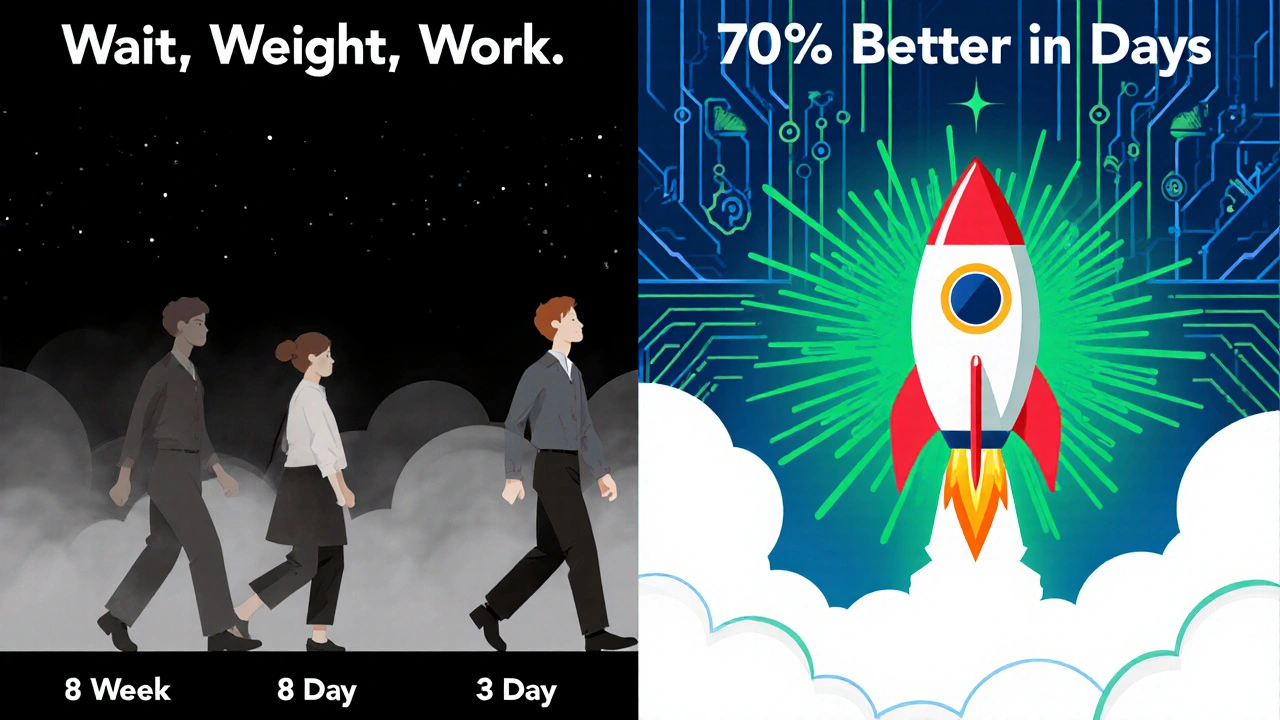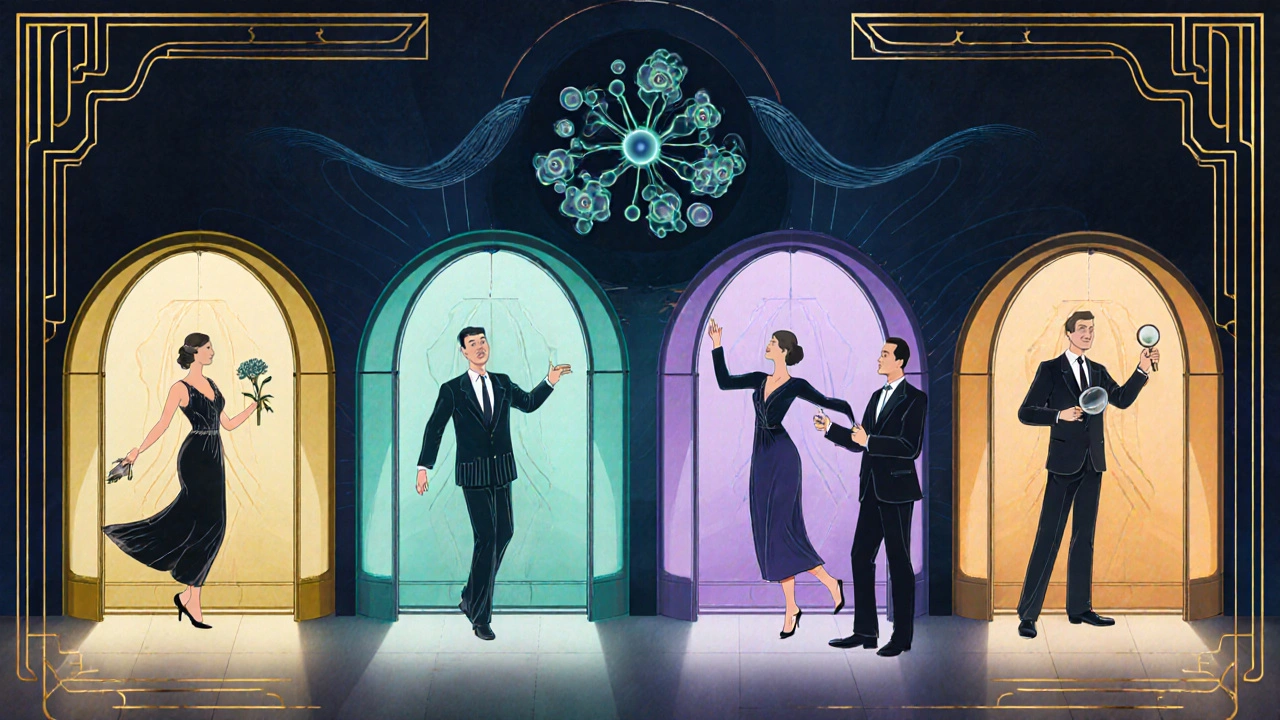Antidepressant Side Effect Comparison Tool
Choose what matters most to you when selecting an antidepressant:
| Medication | Sexual Side Effects | Weight Gain | Onset of Action | Cost | Key Risk |
|---|---|---|---|---|---|
| Exxua | 2–3% | Neutral | 10–14 days | $250–$350/month | Mild headache |
| Auvelity | 15–20% lower than duloxetine | Lower than most SNRIs | 4–5 days | $1,000–$1,200/month | High blood pressure (monitor) |
| Zuranolone | 0% | Neutral | 3–7 days | $9,450 for 14-day course | Dizziness, sleepiness |
| SPRAVATO | Under 10% | Neutral | 24–48 hours | $880 per dose (multiple doses needed) | Dissociation (45–55%) |
| Traditional SSRIs | 30–70% | 10–15% average gain | 4–8 weeks | $4–$10/month (generic) | GI upset, insomnia |
For years, people taking antidepressants have faced a tough trade-off: relieve depression, but at the cost of weight gain, sexual problems, drowsiness, or nausea. Many quit because the side effects felt worse than the symptoms. But in 2025, that’s changing. A wave of new antidepressants is hitting the market-not just as alternatives, but as smarter tools designed to work faster and hurt less. These aren’t tweaks of old drugs. They’re built on completely new science, targeting brain pathways we barely understood a decade ago.
Why the old drugs fall short
Most people still start with SSRIs like sertraline or escitalopram. They’ve been around for decades, and they work-for some. But here’s the reality: 30% to 70% of users experience sexual dysfunction. Up to 15% gain noticeable weight within six months. Nearly half report stomach issues. These aren’t rare glitches. They’re expected outcomes. And for many, the trade-off isn’t worth it. That’s why so many stop taking them-even when they’re helping their mood.The new players: faster, cleaner, different
By late 2025, four new antidepressants have moved from clinical trials into real-world use. Each works differently-and each avoids the classic side effects in surprising ways.Exxua (gepirone), approved in September 2023, is the first new chemical antidepressant in over ten years. Unlike SSRIs, it doesn’t flood the brain with serotonin. Instead, it gently stimulates serotonin receptors in a targeted way. The result? A 2-3% rate of sexual side effects, compared to 30-50% with older drugs. Patients report mood improvement in under two weeks-no waiting months. It’s also weight-neutral. No gain. No loss.
Auvelity (dextromethorphan/bupropion), approved in 2022, combines two existing drugs in a new way. Dextromethorphan blocks a brain receptor linked to depression, while bupropion keeps it active longer. This combo works in days, not weeks. Weight gain? About 15-20% lower than with duloxetine. Sexual side effects? Much less common. It’s taken as a daily pill, no clinic visits needed.
Zuranolone (Zurzuvae) is a neurosteroid that calms overactive brain circuits. Approved in 2023 for postpartum depression and expanded to all major depression in October 2025, it’s taken as a 14-day course. No daily pills for months. Just two weeks, once a day with food. In trials, 70% of postpartum patients saw major improvement. Side effects? Dizziness in 25%, sleepiness in 20%. But no sexual dysfunction. No weight gain. It’s a reset button, not a lifelong commitment.
SPRAVATO (esketamine), approved in 2019, is a nasal spray that acts on the glutamate system. It’s the fastest-some feel better within 24 hours. But it’s not simple. You must use it in a certified clinic. After each dose, you wait two hours under supervision. Why? Because 45-55% of users experience dissociation-feeling detached from your body or surroundings. It’s not hallucinations, but it’s intense. For some, it’s life-changing. For others, it’s too much. Still, it’s the go-to for treatment-resistant depression, where other drugs have failed.
How they compare: side effects at a glance
| Medication | Sexual Side Effects | Weight Gain | Onset of Action | Key Risk |
|---|---|---|---|---|
| SSRIs (e.g., sertraline, escitalopram) | 30-70% | 10-15% average gain | 4-8 weeks | GI upset, insomnia |
| Exxua | 2-3% | Neutral | 10-14 days | Mild headache |
| Auvelity | 15-20% lower than duloxetine | Lower than most SNRIs | 4-5 days | High blood pressure (monitor) |
| Zuranolone | 0% | Neutral | 3-7 days | Dizziness, sleepiness |
| SPRAVATO | Low (under 10%) | Neutral | 24-48 hours | Dissociation (45-55%) |

Cost and access: the hidden barrier
These new drugs aren’t cheap. A 14-day course of Zuranolone costs about $9,450. SPRAVATO runs $880 per dose-and you need multiple doses over weeks. Insurance often requires prior authorization. Only 1,243 clinics nationwide are certified to give SPRAVATO. That’s a problem in rural areas. Meanwhile, generic fluoxetine costs $4 for 30 tablets. The price gap is real. For many, the old drugs win-not because they’re better, but because they’re affordable.Some patients report life-changing results. One Reddit user, after 15 years on SSRIs with severe sexual side effects, switched to Exxua in January 2025: “No ED issues. Mood lifted in 10 days. I feel human again.” Another, trying SPRAVATO, wrote: “It worked, but I felt like I was floating out of my body. I couldn’t do it again.”
Who benefits most?
These new drugs aren’t for everyone. But they’re game-changers for specific groups:- People with sexual side effects from SSRIs → Exxua or Auvelity
- Postpartum depression → Zuranolone (70% response rate)
- Treatment-resistant depression → SPRAVATO or Auvelity
- People who can’t wait 6 weeks → Zuranolone or SPRAVATO
- People with weight concerns → Exxua or Zuranolone
For others-those with mild depression, stable insurance, or no side effect history-SSRIs still make sense. They’re proven, cheap, and well-understood.

What’s still missing
The biggest concern? Long-term data. All these drugs were tested in trials lasting 6-12 weeks. We don’t yet know how they affect the brain over years. Are they safe for someone taking them for five years? What happens if you stop Zuranolone after two weeks? Can you restart it? These questions are unanswered.Also, clinical trials often leave out older adults, people with diabetes, heart disease, or multiple medications. Real-world patients are more complex. A 2025 study from Imperial College London warned: “We’re prescribing based on young, healthy volunteers. The real world is messier.”
What’s coming next
Aticaprant, a drug targeting a different brain receptor (kappa opioid), is in late-stage trials. Early results show a 60% response rate in treatment-resistant depression-with almost no weight gain. It could be approved by mid-2026.Researchers are also testing genetic tests to predict which antidepressant will cause which side effect in you. The NIH is funding a project aiming for 85% accuracy. Imagine a blood test that tells you: “Sertraline will likely cause weight gain. Exxua is your best bet.” That’s not science fiction-it’s coming.
The bottom line
The future of depression treatment isn’t about one magic pill. It’s about matching the right drug to the right person. If you’ve struggled with side effects, you’re not broken. You just haven’t found the right tool yet. Exxua, Zuranolone, Auvelity, and SPRAVATO offer real alternatives. They’re not perfect. But they’re better. And for the first time in decades, patients have choices that don’t require sacrificing their body to feel better.Talk to your doctor-not just about whether an antidepressant works, but how it affects your life. Ask: “What’s the side effect profile? Is there a faster option? Is there one that won’t hurt my sex life or make me gain weight?” The answers might surprise you.
Are the new antidepressants safer than SSRIs?
Yes, for specific side effects. Newer drugs like Exxua and Zuranolone have far lower rates of sexual dysfunction and weight gain-two of the biggest reasons people stop taking SSRIs. But they come with different risks: SPRAVATO can cause dissociation, Zuranolone may cause dizziness, and Auvelity can raise blood pressure. Safety depends on your health history and what side effects matter most to you.
How fast do the new antidepressants work?
Traditional SSRIs take 4-8 weeks to work. The new ones are much faster. Zuranolone and Auvelity show improvement in 3-7 days. SPRAVATO can work in as little as 24 hours. Exxua takes about 10-14 days-still faster than older drugs. This speed matters for people in crisis or those who’ve waited too long to feel better.
Can I switch from an SSRI to one of the new drugs?
Yes, but not without guidance. Stopping an SSRI suddenly can cause withdrawal. Your doctor will likely taper you off slowly before starting the new medication. Some combinations are dangerous-like mixing SPRAVATO with certain antidepressants. Always work with a psychiatrist or provider experienced in these newer treatments.
Why is SPRAVATO so expensive and hard to access?
SPRAVATO requires administration in a certified clinic with 2-hour monitoring after each dose. This adds staff, space, and safety protocols-raising costs. Only about 1,200 clinics in the U.S. are certified. Insurance often requires prior authorization, and many plans don’t cover it without proof of treatment failure. The cost isn’t just the drug-it’s the whole system around it.
Do these new drugs cure depression?
No drug cures depression. These new medications help manage symptoms, often very effectively. Zuranolone is a 14-day course, not a lifelong treatment. SPRAVATO is used for acute episodes, not maintenance. Exxua and Auvelity can be taken long-term, but depression is often chronic. Therapy, lifestyle changes, and social support still matter. These drugs are tools-not cures.
Is there a risk of addiction with these new antidepressants?
None of the new antidepressants approved by 2025 are considered addictive. SPRAVATO is derived from ketamine, which has abuse potential, but esketamine (the form used in SPRAVATO) is given in controlled doses under supervision. Zuranolone, Exxua, and Auvelity have no known abuse liability. The FDA has not flagged any as addictive. The bigger risk is dependence on long-term use, which applies to all antidepressants.
What if I can’t afford the new antidepressants?
Cost is a real barrier. Generic SSRIs cost as little as $4-$10 a month. If you can’t afford the new drugs, don’t give up. Talk to your doctor about switching to a better-tolerated SSRI like citalopram (Celexa), which has lower weight gain than sertraline. Some pharmaceutical companies offer patient assistance programs. Clinical trials for new drugs often provide free medication and care. Your mental health matters-there are options even if the newest ones aren’t affordable yet.


Bill Camp
November 19, 2025 AT 10:41These new drugs are a godsend-but let’s be real, the pharmaceutical industry is just selling us a new kind of dependency. They’re not curing anything, just repackaging the same old poison with a shiny label and a 10,000% markup. You think you’re getting freedom? You’re just trading one prison for another-with better Wi-Fi.
Sarah Swiatek
November 20, 2025 AT 01:52Wow. I’ve been on SSRIs for 8 years. Sexual dysfunction? Check. Weight gain? Check. Feeling like a zombie? Triple check. Switched to Exxua last month. 12 days in. No ED. No weight change. Actually woke up excited to get out of bed. I’m not crying. I’m just... alive again. And yeah, it’s expensive. But so is therapy. And grief. And losing 10 years of your life to a drug that makes you hate your own skin.
rob lafata
November 20, 2025 AT 10:25Let me guess-you’re one of those people who thinks ‘fast-acting’ means ‘magic bullet.’ SPRAVATO gives you dissociation? That’s not a side effect, that’s a spiritual awakening wrapped in a corporate patent. And Zuranolone? A 14-day reset? Like you’re rebooting your iPhone after a crash. Depression isn’t a glitch-it’s a worldview. You can’t fix that with a pill. You need to burn down the system and rebuild it from ash. These drugs are Band-Aids on a hemorrhage.
Rebecca Cosenza
November 20, 2025 AT 13:05My cousin tried Zuranolone. Dizzy for 3 days. Couldn’t drive. Felt like a drunk toddler. She said it helped her mood-but she’s not doing it again. If the side effects make you feel worse than the depression, what’s the point? 😔
Brianna Groleau
November 21, 2025 AT 02:42I’m a nurse in rural Iowa. We have one psychiatrist in the whole county. SPRAVATO? We can’t even get the meds here. Patients are crying because they can’t afford the $9,000 course. I just hand out generic fluoxetine and tell them it’s not perfect-but it’s better than nothing. These drugs are brilliant. But they’re only for people who live in cities with good insurance and a therapist on speed dial. That’s not healthcare. That’s a luxury brand.
Lemmy Coco
November 22, 2025 AT 21:45just read this whole thing and i think exxua sounds amazing but i wonder if the long term effects are really known? like what if after 5 years it starts messing with your liver or something? i know its new but i just want to be careful. also i heard some people get weird dreams on it? not sure if that’s true
Nick Naylor
November 24, 2025 AT 12:17Let’s not pretend this is progress. These drugs are the result of billions in lobbying, not science. The FDA is a revolving door. The trials are funded by the companies that profit from them. You think Zuranolone’s 70% success rate is real? It’s cherry-picked data from a sample of 30-year-old white women with no comorbidities. Meanwhile, the elderly, the poor, the disabled? They’re excluded. This isn’t medicine. It’s marketing dressed in white coats.
And don’t get me started on the ‘genetic test’ fantasy. You think they’re going to give you a blood test that says ‘don’t take sertraline’? No. They’ll sell you the test for $800 and then charge you $1,200 for the ‘recommended’ drug. This is capitalism with a stethoscope.
And yet-despite all this-I’m still grateful. Because for the first time, someone listened to the people who said ‘I can’t take this anymore.’ Even if it’s flawed, even if it’s expensive, even if it’s rigged-this is a step. Not a leap. Not a revolution. But a step. And sometimes, that’s all you get.
serge jane
November 25, 2025 AT 08:18There’s something profoundly human about how we’ve reduced emotional suffering to a chemical equation. We want a pill that fixes the soul without asking why the soul is broken. We don’t ask why depression is so prevalent in a society that tells us to be happy while working 60 hours a week, drowning in debt, isolated by algorithms, and terrified of the future. These drugs don’t address the rot. They just make the rot easier to ignore. And that’s not healing. That’s anesthesia. But I won’t judge someone for taking it. Because if you’re drowning, you grab anything that floats-even if it’s a plastic toy shaped like a lifeboat.
Dave Wooldridge
November 26, 2025 AT 21:46Did you know SPRAVATO is linked to the CIA’s MKUltra program? Ketamine was used in mind control experiments in the 60s. Now it’s back-prescribed in clinics with cameras everywhere. Who’s watching? Who’s recording? Why does it require a 2-hour observation? Are they making sure you don’t remember what you saw? I’m not saying it’s true-but why is no one asking these questions?
Rusty Thomas
November 27, 2025 AT 08:05Okay but like… SPRAVATO sounds like a rave experience. Like, you take it, you float out of your body, you see colors, you cry, you laugh, you feel like you’ve met God. Then you come back and your depression is gone? That’s not medicine. That’s a psychedelic pilgrimage. I want to try it just to see what happens. 🤪
Matthew McCraney
November 27, 2025 AT 14:18My brother took Exxua. Said it ‘changed his life.’ Then he got fired. Then his girlfriend left. Then he started talking about ‘the system’ and how the pills are made of microchips. He’s in a psych ward now. So yeah. It works. But what if it works too well? What if it wakes you up to a world you can’t stand? Maybe depression was the only thing keeping him sane.